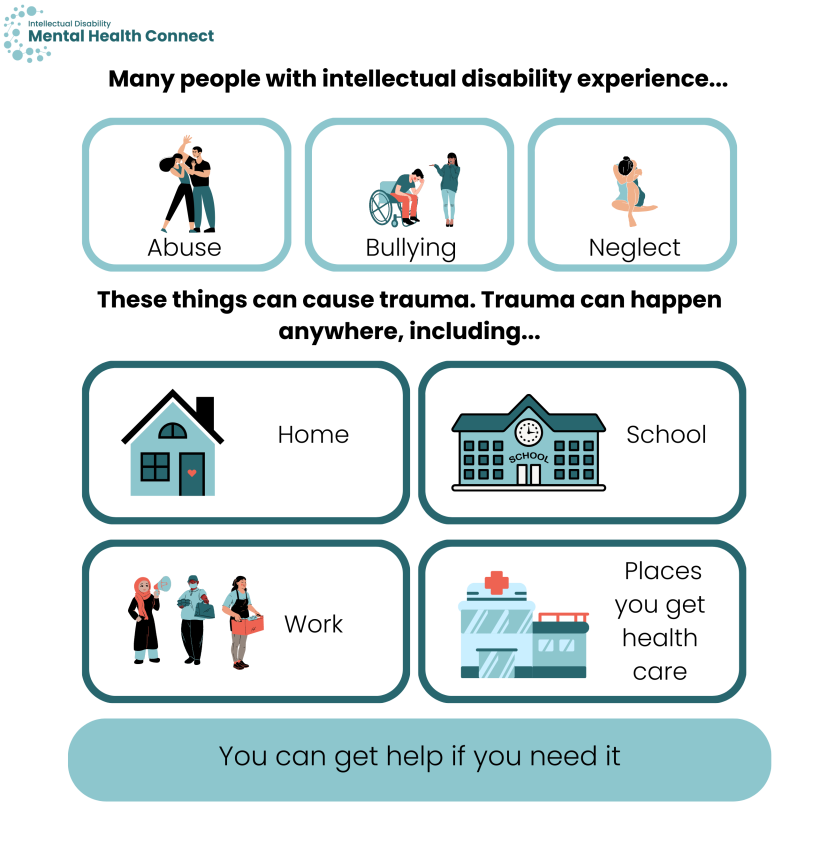People who have had trauma
Jump to a section below
Introduction
Trauma is when something has happened to you that made you frightened or very upset.
Everyone has different things that make us frightened or very upset.
People with intellectual disability can experience many situations or events that can cause them to have trauma.
Trauma can happen to you anywhere, including:
- at home
- at school
- at work
- when you are getting health care.
Many people with intellectual disability experience abuse, bullying or neglect.
- Abuse is when someone says or does something to hurt you or make you feel bad.
- Bullying is when someone is mean to you on purpose and makes you feel bad.
- Neglect is when someone who is supposed to be supporting you does not do it properly.
These things could happen one time, or many times.
Abuse, bullying and neglect can cause you to have trauma.
You can tell someone you trust if abuse, bullying or neglect is happening or has happened to you. Even if it has only happened one time, you can still tell someone you trust about it. Someone you trust could be a carer, family member, friend, support worker or doctor.

There was a Royal Commission into Violence, Abuse, Neglect and Exploitation of People with Disabilities. A Royal Commission means that a group of people listened to the experiences of people with disability and told the government how to make things better. You can find more information and what they found on their website – they have Easy Read information.
Concerns you may have when getting help for your mental health and what you can do
My mental health worker does not ask about bad things that have happened to me in the past
It is important to get help if bad things have happened to you and you think you have trauma. Your mental health worker may not ask you about these things and it can be hard to tell someone about them. Many people feel stressed or worried when discussing trauma, this is normal. But discussing trauma can help you.
It is OK to tell your mental health worker if you think you have trauma or if bad things have happened to you in the past.
Telling the mental health worker means they can understand you better when helping you with your mental health. If it is too hard to tell your mental health worker, you can tell someone you trust. You could ask this person to tell your mental health worker what you have told them.
My mental health is not getting better because I am experiencing abuse, bullying or neglect right now
If you are experiencing abuse, bullying or neglect right now, it is important to tell someone you trust.
This person can then help to stop the abuse, bullying or neglect. You can tell someone you trust what is happening to you even if you are not sure if it is abuse, bullying or neglect.
It can be hard to tell someone about abuse, bullying or neglect. You might not know what to tell them or have the right words to tell them what is happening. You can use resources like these communication boards to tell someone you trust.
If someone is hurting you badly and you feel like you are in danger, you should call the police on 000.
My mental health is not getting better because I am always reminded of the bad things that have happened
If you have experienced trauma, it can be hard to stop thinking about it. You might be living or working in the same place where these bad things happened to you. This means that you may be reminded of these bad things.
Sometimes you have very little control over where you live or where you work. But if you cannot stop thinking about what has happened to you or cannot stop the reminders, you should tell someone you trust. Someone you trust might be able to help you to change where you live or where you work. This can mean that you feel less stressed or uncomfortable.
Services and supports
- Call the Disability Abuse and Neglect Hotline if you want to tell someone about abuse, bullying or neglect you are experiencing. It is free to call them. You can call them on 1800 880 052.
- The Speak Up and Be Safe From Abuse resources can help you to tell someone that you experienced or are experiencing abuse. They have communication boards that can help you if you find it difficult to tell someone what has happened.
- The Royal Commission into Violence, Abuse, Neglect and Exploitation of People with Disabilities was a group of people who:
- listened to the stories of people with disability
- told the government how to make things better. You can view what the Royal Commission found in their final report. There are Easy Read versions.